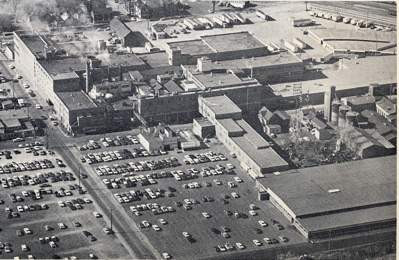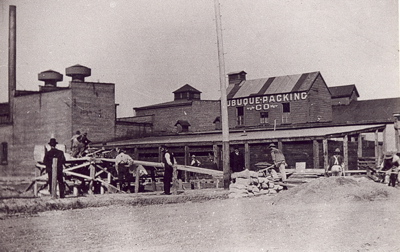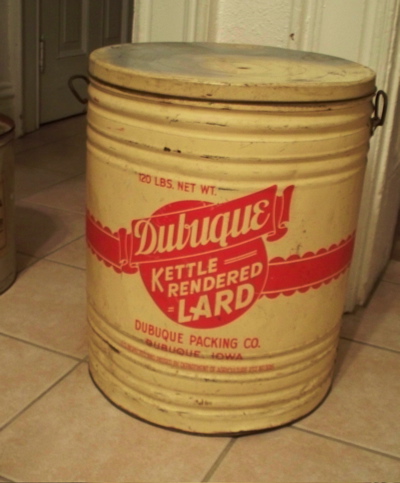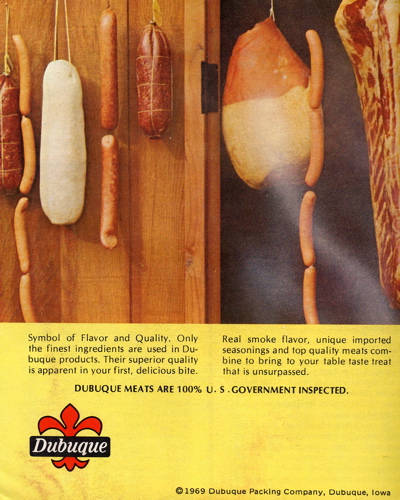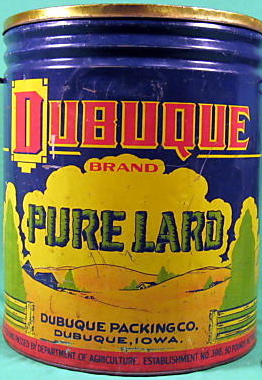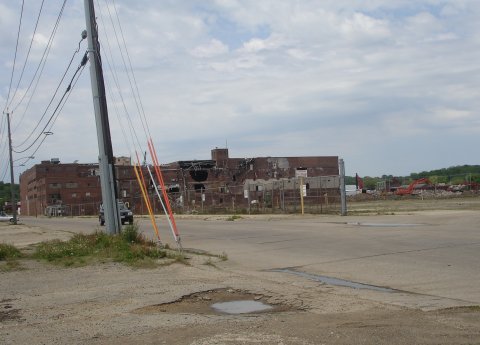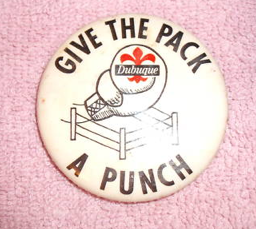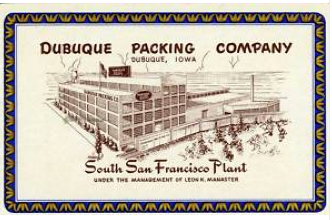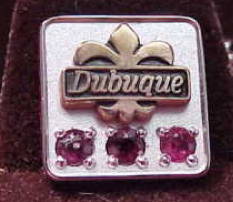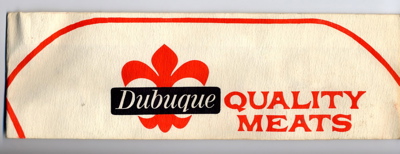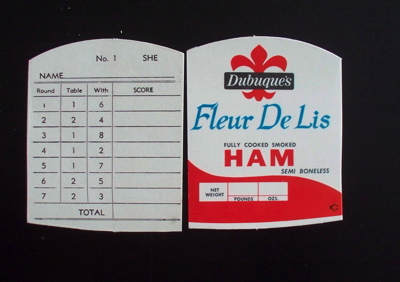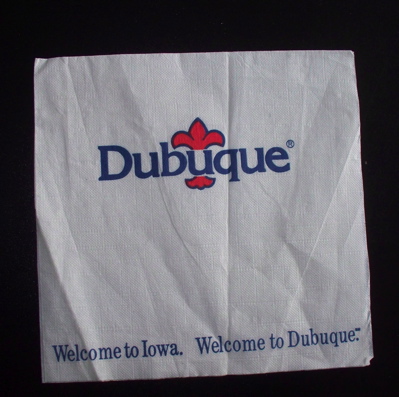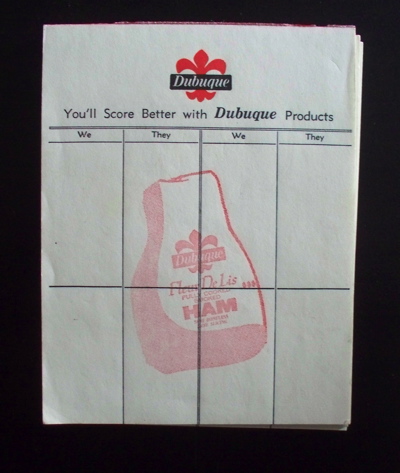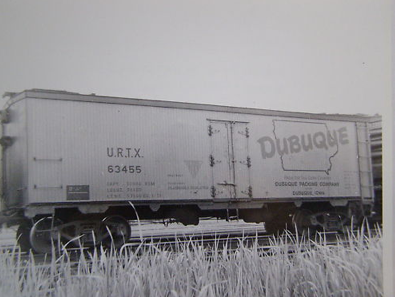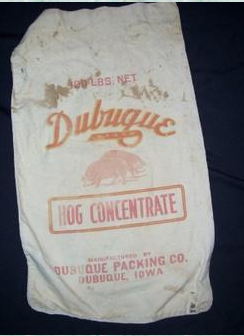Encyclopedia Dubuque
"Encyclopedia Dubuque is the online authority for all things Dubuque, written by the people who know the city best.”
Marshall Cohen—researcher and producer, CNN
Affiliated with the Local History Network of the State Historical Society of Iowa, and the Iowa Museum Association.
DUBUQUE PACKING COMPANY: Difference between revisions
No edit summary |
No edit summary |
||
| Line 68: | Line 68: | ||
[[Image:scorepad.jpg|right|thumb|200px|Metal tag. Photo courtesy: Bob Reding]] | [[Image:scorepad.jpg|right|thumb|200px|Metal tag. Photo courtesy: Bob Reding]] | ||
[[Image:dubuquepackrrcar.png|left|thumb|200px|Railroad car bearing the Dubuque Packing Company advertisement.]] | [[Image:dubuquepackrrcar.png|left|thumb|200px|Railroad car bearing the Dubuque Packing Company advertisement.]] | ||
[[Image:hog. | [[Image:hog.png|right|thumb|250px|]] | ||
--- | --- | ||
Revision as of 03:02, 26 August 2011
DUBUQUE PACKING COMPANY. Once one of Dubuque's largest employers. The Dubuque Packing Company began with the merger in June 1891 of the Dubuque Butchers' Association and the Dubuque Packing and Provision Company. The new corporation, named the Dubuque Packing Company, began business on July 1, 1891, with a capitalization of $50,000. The directors were J. W. Saunders, C. Steiber, L. Reinecke, and Christian Schmidt.
In 1931 the local meat supplier was purchased by Harry WAHLERT from the Christian Schmitt family for $180,000 when it employed only sixty people. Growing rapidly through the Great Depression, largely through Wahlert's guidance, "the Pack" produced canned hams, the first American food product to be exported after WORLD WAR II. Dubuque also became one of the largest producers of kosher meats in the United States.
By the 1950s, Dubuque Packing Company was the second largest employer in the city. In the 1960s the company's workforce reached 3,500. Annual sales in the 1970s supported a payroll of $20 million. The end of the 1970s saw thousands of people dependent on Dubuque Pack either directly or indirectly, and wages won through negotiations were among the highest paid in the city. In 1978 the company was listed in an issue of "Dun's Review" as the fifteenth largest private company in the United States. Annual sales were estimated at $796 million.
Other facts about the company were equally impressive. Dubuque Pack was the first United States producer to export food products, canned hams, to Italy following WORLD WAR II.
Canned hams produced by Dubuque Pack won the first gold medal for the best hams at the 1960 and 1961 California state fairs. During peak production, nine thousand hogs could be processed daily. A little known fact was that Dubuque Pack was one of the nation's largest producers of kosher meat.
In 1980 "the Pack" was a major force in the economy of Dubuque, one of nine cities nationwide in which the company had plants. Workers "on the line" earned an average of $25,000 in annual wages plus an additional $11,000 in fringe benefits according to company estimates. This included an average of five weeks of vacation per year.
In 1980 the company claimed to have lost $9.9 million primarily through its beef operations. Of the 115 men working in the beef kill, the youngest had 21 years of seniority resulting in a large number of benefits the company had to pay. The company wanted the production standard increased from 115.8 head of cattle per hour increased to 160. Union officials noted that with incentive pay, the workers were already slaughtering more than 115.8 but not 160. Union officials acknowledged that the company could build a one-story facility increasing efficiency over the five-story Dubuque plant were carcasses had to be moved from floor to floor. They also agreed that the company would probably gain from property tax concessions from any community near a new plant and that younger workers would cost less.
Blaming a changing market, high wages, and inefficient equipment, the company asked for wage and benefit concessions and closed parts of the Dubuque plant promising only to "maintain a presence" in Dubuque. The hog kill was closed in 1981 with a loss of 1,400 jobs.
In April 1982, officials of Dubuque Packing Company announced they would close the Dubuque plant on October 16th. This action had the potential of creating unemployment for 1,200 workers and possibly raising Dubuque's unemployment rate to 17.3 percent.
News of the closing caught city officials by surprise. Union workers at the Pack had taken a 15.8 percent cut in pay and health insurance and given up some vacation time in October 1981 to keep the plant open. The City had given the company a 20 percent reduction in its property tax assessment on buildings in addition to a 38 percent reduction in its machinery assessment. Company officials would not discuss potential sale of the plant in the announcement.
In the fall of 1982, amid charges of union busting, the company sold the pork operation, Dubuque plant, and fleur-de-lis trademark to Robert Henry WAHLERT and the newly created FDL FOODS INC., for $30.5 million. The sale resulted in approximately five hundred employees being forced to accept lower wages or early retirement.
After the sale, Dubuque Packing Company moved its offices to the DUBUQUE BUILDING and kept a low news profile. Arguments continued with Local 150 over health insurance and pension benefits.
---
Source:
'The Pack" Changes. Quad City Times, July 20, 1980, p. 9a


